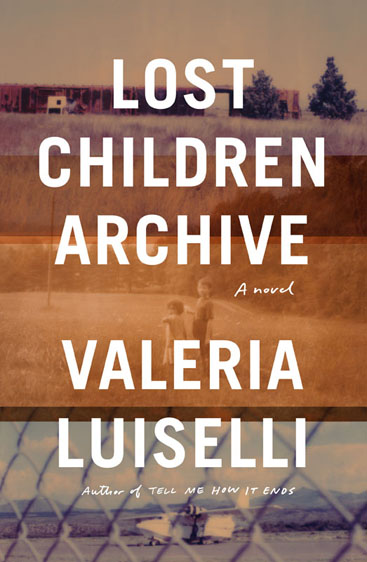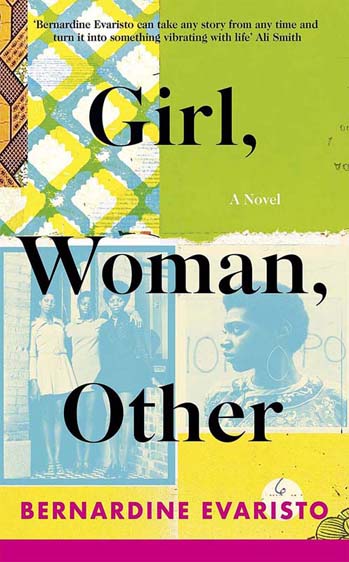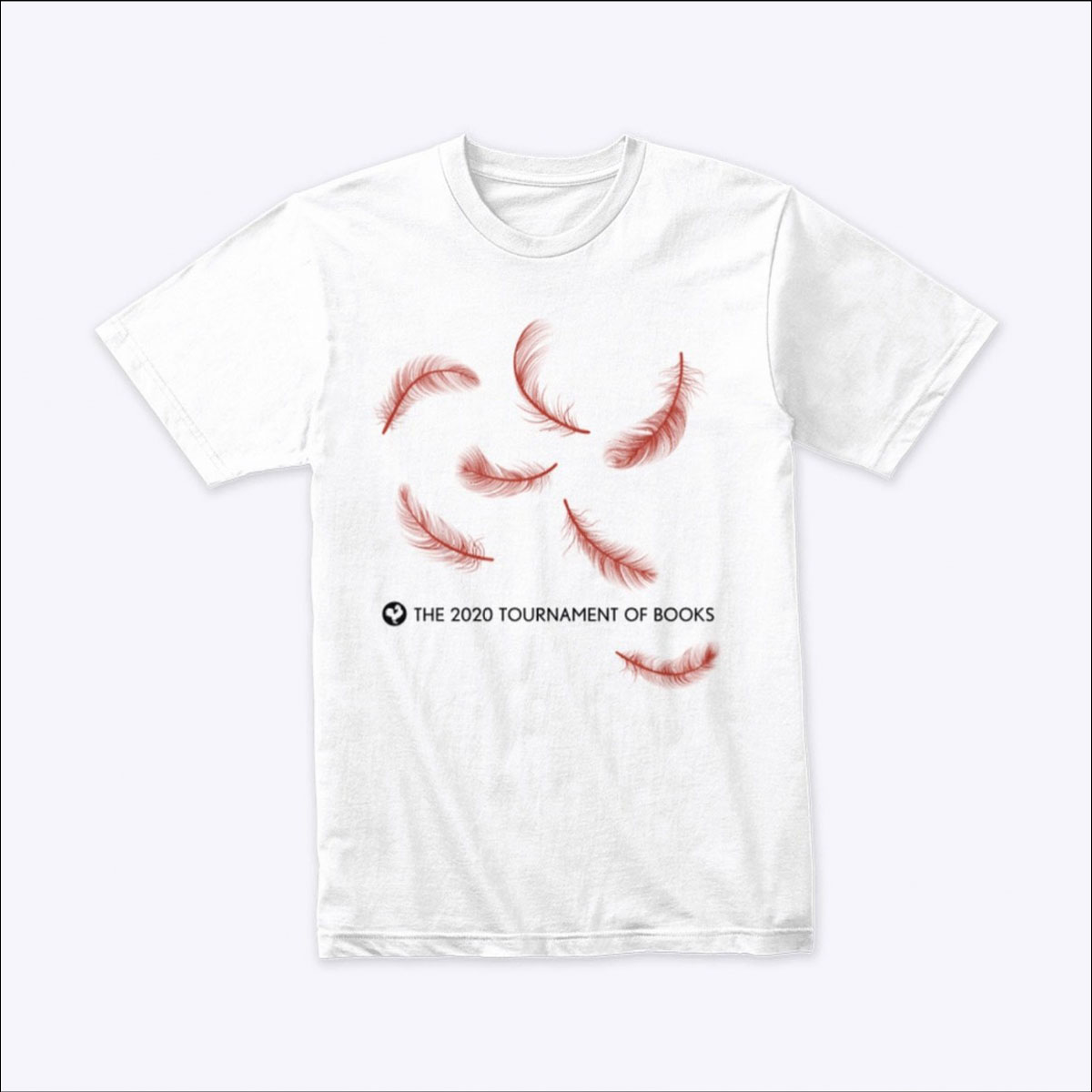Jade Chang: As generations of Tournament of Books arbiters before me have realized, judging art is dumb. OK, judging art is complicated. Also, I know how hard it is to write a book, so I don’t want to hurt anyone’s feelings! In an attempt to combat these soft feelings with hard science, I’ve established a totally objective set of criteria delineating what I personally value in a reading experience.
Is it a fast read? Emotionally, this is my number one. I want flow-state reading, where you start a novel on a sunny afternoon and don’t reenter the world until the stars come out.
Girl, Woman, Other is a joyful tumble through the lives of its 12 characters. In description, the book’s prose-poetry style sounded like it would be annoying to me, but in reality it was masterful and propulsive, giving even the saddest moments a sense of triumph! I was pulled into each world immediately. How can you deny a passage like, “can’t they see i’m a living goddess? Dominique shouted with a flamboyant gesture, flicking her fringe, adopting a sultry pose as heads turned,” as a character’s response to being turned down for yet another demoralizing role for black actresses?
The first part of Lost Children Archive took days to get through. We’re dropped into a family on the verge of breaking apart, but it is a long and slow separation. There were many, many beautiful, profound, funny things in this first half (for example, photography is explained to a child as akin to “recording the sound of an echo”), but I resented having to be a part of their bad relationship—and then the novel took a turn and I realized SPOILER ALERT that I was actually part of a (totally platonic! don’t worry!) sibling love story. Still, the first part was sloooow.
Point: Girl, Woman, Other
Is it surprising? Factually, I know that the UK has never been entirely white, no matter what the Corset Industrial Complex would have us believe. But I’ve mostly read and seen contemporary stories of black women in the UK, and it was a real pleasure to see Girl, Woman, Other go further back in history than I expected. It wasn’t exactly a surprise, though, and the final revelation of a twist—though emotionally satisfying—was easy to spot coming.
My mom will often sit halfway through a movie, then declare, “I’ve already played this game,” and stop watching. I felt that way when Lost Children Archive first introduced its clear obsession with mapmaking—it’s one of those things, like palimpsests and mirroring and inexplicable melancholy, that many writers find fascinating for a time. I definitely did and because of it I thought I knew exactly what was going to happen with Lost Children Archive. Oh, but I was wrong! Here maps—and several other devices—are used to devastating effect.
Point: Lost Children Archive
Are the characters interesting? Likability has been discussed to death—even typing the word feels boring to me. Instead, I think it’s the responsibility of an author to create characters that are interesting, that hold my attention, that are as weird or weirdly normal as actual people. (I also think it’s the responsibility of authors to never say, “My characters have a mind of their own.” They live in your mind! You made them!)
This was a hard one. I got to know the characters in Lost Children Archive much better because there are only four of them, but they feel somewhat archetypal. We only ever know them by the nicknames they give themselves and by their position in the family: Pa and Ma, brother and sister. Girl, Woman, Other has three times as many characters and we never really get the chance to hang out with any of them in an easy way, but they do feel very open to the reader, everyone is introduced to us with heart in hand, ready to be seen.
Point: Girl, Woman, Other
Is it cozy? Coziness in life is about feeling comfortable and taken care of, but I’m not looking for the reading equivalent of a cashmere blanket. I don’t need to feel safe, and I like to be challenged, but there is something satisfying when those things happen in a familiar world. For example, I’d put two fairly spiky books—The Secret History and Woman Warrior—in that category. Romantic, murderous, East Coast college students and Chinese families in California are both my people! With both of those books I am just somehow sure, from the very first word, that we are going to go somewhere good. And because of that I never have to stop and assess my feelings in the middle of reading. Instead, I can just sail forward, knowing that I will reach an exciting port.
When it comes to Girl, Woman, Other and Lost Children Archive, I never doubt the skill of either author, but I don’t feel that combo of trust and familiarity. Neither of these novels feels all that cozy to me, and definitely not one over the other, but I do predict potential cozy vibes for many other readers!
Point: N/A
Is it about the world right now? Because I’m writing from Los Angeles in 2020 as a child of immigrants and as a person who is deeply hopeful and deeply conflicted about America, Lost Children Archive feels more immediately vital to me than Girl, Woman, Other. I think about the children who are being imprisoned by the US government every day and about the children who elude the government and walk through the desert. I don’t know what to do and am obviously not doing enough. Lost Children Archive dives into that uncertainty and worry and has no answers to give because the moment isn’t over.
It seems rude to ding Girl, Woman, Other just for being its fantastic self. After all, it’s also about something vital: all the different ways that you can be black and a woman or gender nonconforming in the UK right now. But the now feels more like a destination and less like a point on the journey—these characters have already overcome their obstacles and claimed their places. So, by a drop…
Point: Lost Children Archive
Did it make me feel something lasting? I have a very bad memory, but if a novel moves me, any mention of the title—even years from now—will trigger the exact same mood/sense I felt while reading it. It’s like having a library of emotions. Honestly, it’s a little too soon to answer this question. I just finished both books and have very easy-to-access emotions tied to each of them. For Girl, Woman, Other it’s a fizzy party feeling, weirdly, a feeling of winning an artistic award, a sort of well-deserved self-satisfaction. With Lost Children Archive it’s much lonelier, an elemental solo-road-trip feeling where the sun is always about to set and the world feels hollow and big. Will they last? I hope so.
Point: N/A
Oh god, it’s a tie. OK, it’s technically a tie, but thinking through the books like this has helped me choose a winner. This is what I realized: I love things that are easy to enjoy, but I really love things that make me work and then reward my effort. The experience of reading Girl, Woman, Other was more delicious throughout, and I admire it in many ways, but I felt more challenged and satisfied when I reached the end of Lost Children Archive.
Final verdict: You should probably just read every book in the Tournament and pick your own winners.
Thank you to Quail Ridge Books for sponsoring today’s match! Valeria Luiselli’s event at Quail Ridge Books has been rescheduled for Oct. 27, which means you have more time to preorder a signed copy of Lost Children Archive! Any order placed this month will be shipped for free in the continental US, and includes an official Rooster sticker as an added bonus. Thank you for supporting community bookstores!
Follow Quail Ridge Books on Instagram, Facebook, and Twitter.
Match Commentary
By Kevin Guilfoile & John Warner
Kevin Guilfoile: John, this is going down on my shortlist of favorite all-time judgments in the ToB. Judge Chang took the admittedly impossible and stupid task we assigned her, and broke it down into logical steps designed to impose some order (which is kind of witty, actually), but what she really did was seriously examine why and how she reads, which is the unspoken point of this whole dumb exercise. I was fascinated by the way she walked us through her decision. Love it.
John Warner: What I love about the judgment is the transparency of values Judge Chang brings to her reading. Take, for example, “cozy.” I totally get what she means by this, and I definitely enjoy the qualities Chang ascribes to cozy here, and I like a good cozy book, but I would say that my favorite books are decidedly uncozy, like Flannery O’Connor’s Wise Blood or Patricia Highsmith’s The Talented Mr. Ripley. I like that Judge Chang understands these aspects of her readerly responses so well. It makes me consider my own responses more deeply.
Kevin: I struggled more than Judge Chang with the prose poetry of Girl, Woman, Other. In fact I had the opposite reaction. I found it really effective at the beginning, and less so as I continued to read, especially when I had to put the book down and come back to it later. There was a high bar of reentry for me, and it started to feel gimmicky. On the other hand, I got why Evaristo wanted to do it. I appreciated that the text was physically transgressive in a way that complemented the story, but as the pages piled up I got significantly diminished returns from it.
I don’t want to turn this into more than it is. It’s certainly the author’s prerogative to make that choice, and at a shorter length I think I would have found it extremely effective. At novel length, I thought it tended to obfuscate more than illuminate, and it makes me wonder if I’m not quite getting it. Take the following passage, which I selected at random and then reset as traditional prose:
Winsome wished he hadn’t awakened a longing in her that he wouldn’t satisfy. He’d given her a taste of himself and then withdrawn it. She didn’t hate him for it; she wanted him more because of it. He became fantasy material: They spent erotic afternoons in exotic hotels. She wore sexy underwear, looked younger than her age. In a fantasy anything was possible.
Even now, so many decades later, she feels the old attraction stir when he arrives for the summer, and when she catches him in a certain light.
That’s lovely. Now you are a far more sophisticated reader of poetry than I am, John, so I’ll put the question to you (and to the commentariat, as well): Is it really better like this?:
Winsome wished he hadn’t awakened a longing in her that he wouldn’t satisfy
he’d given her a taste of himself and then withdrawn it
she didn’t hate him for it, she wanted him more because of it
he became fantasy material: they spent erotic afternoons in exotic hotels, she wore sexy underwear, looked younger than her age
in a fantasy anything was possible
even now, so many decades later, she feels the old attraction stir when he arrives for the summer, and when she catches him in a certain light
Eventually I decided that it really wasn’t, for the most part. But I’m willing to be convinced otherwise. Stylistic and typesetting choices don’t obscure that Evaristo is a hell of a writer.
John: I had a similar reaction to the prose style of Girl, Woman, Other. Where I was able to give myself over and not over-worry about getting all of it, I was carried along nicely. Sometimes I felt like I was missing things, though. But a lot of this “missing” of stuff is a bit of an illusion. With the “poetry” format of Girl, Woman, Other, you may be missing one thing while gaining something else.
Luiselli has a distinctive prose style of her own, and Lost Children Archive includes archival materials, maps, other related texts, a collection of related matter meant to inform the story. I am impressed by the scope of Luiselli’s vision, and a refusal to take the story where the reader might expect, but my admiration feels a little clinical, like I get it, but I don’t feel it if that makes sense.
Kevin: Both of these books require a decent-sized buy-in from the reader, right? Once the author has you on her side, you might be all-in for Team Girl or Team Lost (or both). If the reader doesn’t make that commitment, if the reader resists, they, at a minimum, will have some ambivalence.
John: It’s so tricky. I think it’s a danger to put a reader in a position to be asking themselves, “I wonder why (the author) did that?” because it may remove them from the narrative. On the other hand, it may be a fascinating question in and of itself. Maybe this gets us back to Judge Chang’s notion of “being taken care of.”
Kevin: Until I was in the fifth grade, my family used to drive from Pittsburgh to Florida every February (and then back at the end of March), four kids across the back bench of a Cutlass Supreme. Lost Children Archive brought back some really vivid sense memories from those trips, book on my lap, sibling elbows pressing me from either side. I was ready to go on the Lost Children Archive journey, although it did test my general aversion to novels in which the protagonists don’t have names. We have a couple of those on the shortlist this year and here I found myself wincing through it a little bit. As with the prose-or-poetry stylings in Girl, Woman, Other, I felt like I understood why Luiselli made that choice, but at the same time wasn’t sure it was worth it. Anything that calls attention to the artifice of novel writing creates an unnecessary obstacle for my immersion into the story.
On the other hand, I have a general attraction to novels with maps and photos and documents so I think the two things pretty much balanced each other out. In the end I really liked Lost Children Archive. I’ll sign on to Judge Chang’s verdict.
Pulling up the mammoth Zombie database right now, it looks like Girl, Woman, Other is going to fall short of the number it needs to advance to the Zombie Round. I’m afraid we say goodbye to our second Booker winner. If the Zombie Round were held today, Normal People and Nothing to See Here would be our Bad Seed Good Reads.
On Monday, the Road to the Rooster presses on as the alphabetically adjacent On Earth We’re Briefly Gorgeous meets Optic Nerve. Ethan Kuperberg has the gavel and 2020 Reader Judge finalist Vivian Wagner will be in the booth with our very own Rosecrans Baldwin.
New 2020 Tournament of Books merch is now available at the TMN Store. As a reminder, Sustaining Members receive 50 percent off everything in our store. To find out why we’re asking for your support and how you can become a Sustaining Member, please visit our Membership page. Thank you.
Welcome to the Commentariat
Population: You
To keep our comments section as inclusive as possible for the book-loving public, please follow the guidelines below. We reserve the right to delete inappropriate or abusive comments, such as ad hominem attacks. We ban users who repeatedly post inappropriate comments.
- Criticize ideas, not people. Divisiveness can be a result of debates over things we truly care about; err on the side of being generous. Let’s talk and debate and gnash our book-chewing teeth with love and respect for the Rooster community, judges, authors, commentators, and commenters alike.
- If you’re uninterested in a line of discussion from an individual user, you can privately block them within Disqus to hide their comments (though they’ll still see your posts).
- While it’s not required, you can use the Disqus
tag to hide book details that may spoil the reading experience for others, e.g., “ Dumbledore dies .” - We all feel passionately about fiction, but “you’re an idiot if you loved/hated this book that I hated/loved” isn't an argument—it’s just rude. Take a breath.




